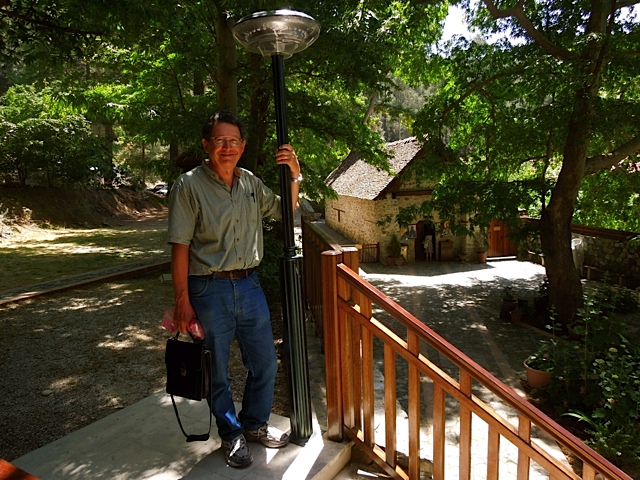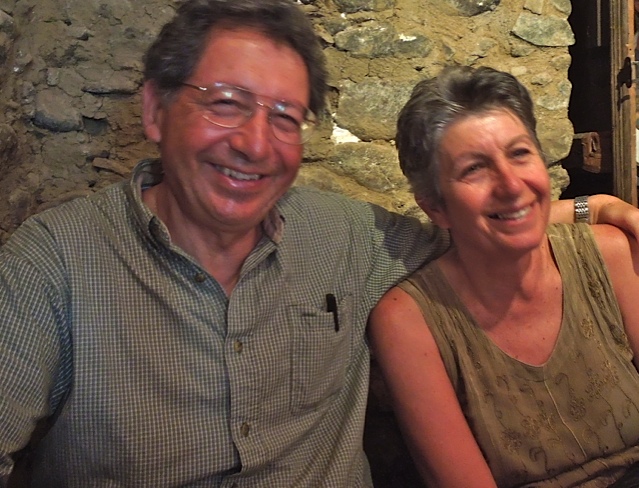
Kyriacos C. Markides at "Meso Potamos," which means "between the rivers" in Greek, the recently restored monastery that appears in the author's groundbreaking new book, Inner River: A Pilgrimage to the Heart of Christian Spirituality. Photo by LPS.
While the Cypriot monastery has no apparent connection to Mesopotamia, where the icon of the hieros games (sacred marriage) was born, Markides' new release on his trilogy on the Eastern Orthodox faith takes the reader into its rebirth as a 21st century archetype through a spiritual pilgrimage in which the author and his wife, Emily, were participant/observers.

Kyriacos and Emily Markides in Cyprus. Photo by LPS
With this new work, Markides has done what arguably no other mainstream western author has been able to do: He has created a holistic 360-degree literary perspective through culmination of the observer/participant narrative of nearly 30 years. Combining Platonic dialogues with the prophetic vision of Gibran, he attracts the mainstream reader by overcoming the Heisenberg Uncertainty Principle...
... thereby creating a new role for the 21st-century author: catalyst to a paradigm leap.
Rather than taking the worn path of the tired intellectual in attempting to either determine position or velocity of the renegade electron, Markides embraces his marginal status of a sociologist consciously engaged in an Uncertainty Principle experiment, with the dynamic presence of his wife, Emily, as a path between the opposites of secular/religious reflecting the split between particle and wave.
Science has a new word for the middle path: the wavicle. Balanced between subject and object, with each book, each chapter, integrated into the whole yet self-contained in and of itself, Inner River embodies not only a literary but a sociological/scientific breakthrough: determining both the position and velocity of a particle in motion.
In both identifying and overcoming the reductionist malaise reflected by the academic intelligentsia, his writing employs both sides of the brain to create a solution embedded in a velocity narrative: action towards personal meaning incorporating past, present and future in a universal leap into a new paradigm.
The author does this by constantly acknowledging the shadow, i.e. the skeptic, throughout by means of Platonic dialogue reflecting the search for universal truth. By his act of embracing the skeptic in characters he refers to as friends, Markides takes his reader with him on a paradigm leap into a cyclical, non-hierarchical understanding of a benevolent universe in which anyone can experience the presence of God simply by remaining open to the possibility that such an intelligent being exists.
Whereas academics who become one with their subjects have a history of becoming vilified, Markides, a sociologist by training, penetrates into the heart of western mysticism through an investigation of the secretive realm of Eastern Orthodox at the heart of his Cypriot identity. He does so by withholding judgement and asking questions that enable his subjects to let him, and his readers, into their reality.
In his first book, The Rise and Fall of the Republic of Cyprus, Markides laid out the historical facts that made the Eastern Orthodox Christianity so essential to the culture of the island where the Archbishop become President when the island won its independence in 1959.
An academic, a sociologist by training, who has written his own spiritual journey -- the path of individuation revealed by way of the synchronicities illuminating his introduction -- into a mainstream form with universal appeal. It is Khalil Gibran's The Prophet and Plato's Dialogues rolled into a culmination of a mystical journey begun by his two earlier books in the trilogy, Mountain of Silence and Riding with the Lion, Markides' breakthrough creates a unique form in his pioneering participant/observer style of spiritual journey. Alternating chapters between his own voice and that of Father Maximus, the spiritual eminence of his earlier books, the author marries the polarities that divide academics from clergy, intellectuals from the spirit.
In his voice, he takes on the role of spiritual teacher to share his knowledge of scientific breakthroughs and the sociological blockages that prevent the intellectual subculture surrounding him (he recounts many anecdotes of discussion with reductionist associates) from making the leap.
By leaving the topic of marriage a temptation from Father Maximus' curtailed discussion with American students in the first chapter, it finally enters in the end of the book. By then, we have become immersed in the personal journey, from visits to Cyprus of Kyriacos and his wife Emily to their journey to visit the relics of St. Catherine on Mt. Sinai, who was killed due to her proclamation of a spiritual weeding with Christ.
Along the way, the author, in his compassionate observance, reveals that his friend Lavlos' wife had a mystical experience with Saint Catherine appearing to her and telling her that she would die on her feast day, which she did. Such anecdotes about death depict the animated world that is at the heart of the Eastern Orthodox tradition, protected from western skepticism by the preservation of its hidden mystical tradition of logos as a connection between mind and heart.
This definition of logos, lost to the western philosophical tradition, is what Markides brings to the reader as a gentle yet thoroughly knowledgeable guide, with his dynamic wife Emily, to the mysteries they have experienced as empirical observers to the mystical tradition that has remained intact in Eastern Orthodox Christianity. Along the way, he gently establishes dialogues with skeptics in the form of academics, surgeons and close friends that serves to bring his readers up to date on scientific breakthroughs investigations of the non-empirical and the failure of the culture to present new models reflecting the paradigm shift that he lives, as a daily reality, with his Cypriot wife, Emily.
The narrative that appears non-linear actually has a trajectory building from the initial promise of a talk about love and marriage, that is fulfilled by the end of the book, as the marriage of the narrative reaches its climax. In the penultimate chapter of the book's title, the topic of marriage is taken up via a synchronicity when Markides visits Fr. Maximos in his office signing marriage licenses and the topic is further brought up by a group visiting his office. At that point, Fr. Maximos says the purpose of marriage is to transcend marriage itself:
The aim is not to conquer, subjugate, and absorb the other person, to obliterate the other's personality, but rather for the two to become a new person. We have, I believe, a unique word in our language when we refer to a married couple. We call them androgyno (manwoman), a new personal reality...this is the ideal one should strive for in a marital bond. (Inner River, pp 252-256)
Just as the renegade electron defies categorization, the Markides enter the unknown passage of their Greek heritage, the hieros gamos. It would seem that they embrace the highest teachings of their subject, Fr. Maximos, to embrace the spirit arising from a formerly hidden path -- of Eastern Orthodoxy -- into the open to revive the western philosophical dialectic for the 21st century.
And this is what makes the book appeal beyond the Christian genre to the universal search for a newly emerging archetype sought by poets, artists and lovers the world over. All paths lead to the same place -- the truth. Never has this been more apparent than in Markides delivery of his compassionate sociological perspective to writing about his Eastern Orthodox faith.
The survival of the planet, he writes, depends on the marriage of Athens (the rational path of western philosophy) with Jerusalem (the intuitive spiritual path of the east). His latest book reveals the author to be a model for the celebration of this union in the individual by means of an authentic inquiry uniting the personal with the universal.
